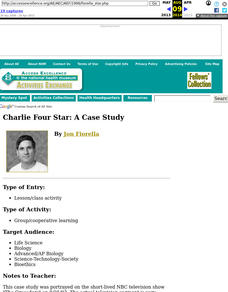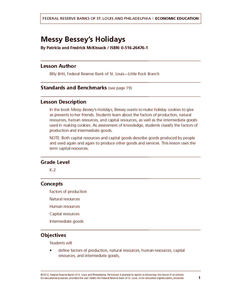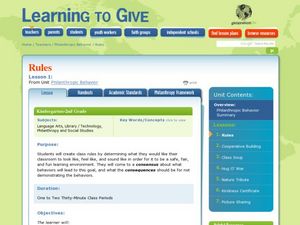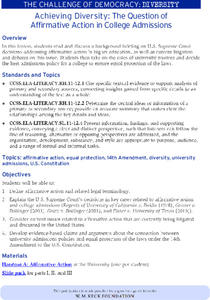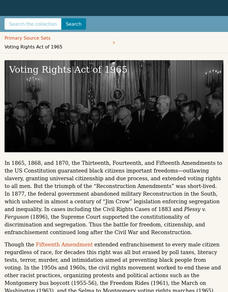Curated OER
Charlie Four Star: A Case Study
Engage in a class debate dealing with the allocation of organs to those waiting for a transplant. How do they decide who gets a transplant and who doesn't? Learners attempt to determine what is fair for the individual requiring an organ...
Curated OER
Go Fish!
Students share a bowl of goldfish crackers. In this lesson on sharing, students see how a limited resource goes furthest when it is evenly shared. Students are allowed to take as many crackers as they would like, and then in contrast,...
Federal Reserve Bank
Messy Bessey's Holidays
Teach your class some fairly complex terms—factors of production, human resources, capital resources, natural resources, and intermediate goods—with a storybook (Messy Bessey's Holidays), plenty of visuals and handouts, and related...
Curated OER
Philanthropic Behavior
Youngsters create class rules by determining the environment they would like to have in their classroom. They come to a consensus about how to have a safe, fair, fun learning environment by discussing the rules in the Karla Kustin poem,...
NPR
Is There Really an Immigration Line?
If you've ever looked at the US immigration system, you know that it is complex and a source of controversy. An insightful lesson plan encourages learners to conduct their own analyses of the US immigration system by asking them to...
Media Education Lab
Sponsored Content as Propaganda
What is sponsored content? Who produces sponsored content? Why? Is it fair or unfair? What are the privacy implications for consumers? To answer these questions, class members view a model screencast before crafting their own that...
Curated OER
Justice, Is it Fair?
Fifth graders investigate conflict resolution through the study of justice. In this justice instructional activity, 5th graders are put in scenarios of unfair conditions. Students discuss the unfair situations and their feelings about...
iCivics
The Road to Civil Rights
Here is a fantastic resource on the civil rights movement! It includes reading materials and worksheets, and particularly highlights major legislation and the role of the judicial branch in the federal government in addressing the...
Curated OER
Western Civilizations, Chapter 12: The Civilization of the Renaissance
If you can't take your western civilization class to the Renaissance Faire, try this online resource to give them an idea of this era and others! While designed to accompany the Western Civilizations text, this tool can be utilized...
Curated OER
Lesson 1: The Importance of Rules in Our Country and in Our Classroom
Explore the importance of rules in a community with the engaging first lesson of this series on the US government. To begin, children play a paper clip game that requires them to make up their own rules as they go, after which the...
US Institute of Peace
Governance, Corruption and Conflict Simulation on Nepal
Can your class help the people of Nepal? Scholars take an in-depth look into the social injustices and struggling economy of a country in turmoil during a multi-day role-playing exercise. After reviewing information on the problems...
PBS
Racial Equality: How Far Have We Come and How Far Do We Have To Go?
Is everyone treated fairly in America? The culminating fifth lesson from a series of five has pupils explore racial inequalities from the 1960s and decide whether or not society has changed over time. The lesson comes with a speech from...
Council for Economic Education
Business in the Middle Ages: Working in a Guild
Long before modern labor unions, guilds worked to ensure that workers had a fair wage. But, in medieval Europe, they also cooperated with the government. Using a simulation and primary source analysis, young scholars become hatters in...
Council for the Curriculum, Examinations and Assessment
Victorian Historians
Take the class back in time to the Victorian Era! The resource provides a plethora of activities that create experiences for scholars in class. Some activities include a fun fair, viewing the starry-night painting, and even experiencing...
ProCon
Vaccines for Kids
All 50 US states require vaccinations for children entering public schools. Pupils set out to determine whether these requirements are fair with a thought-provoking resource. They read an interesting history of vaccines, watch pro and...
PBS
Organizing the Farm Worker Movement
The food on young scholars' tables was likely harvested by hands that fought for fair wages and working conditions. By examining the life of Cesar Chavez and Dolores Huerta, learners connect their daily meals with the struggles of those...
US Department of Commerce
Featured Activity: Let’s Get the Count Right
Don't leave anyone out. To highlight the importance of the US Census to younger learners, an activity has them distribute markers to see if there are enough for each person. They see that counting the population is necessary to fairly...
US Department of Commerce
Apportionment: Grades 7-8
One person, one voice ... right? Using a simulation where uneven groups are given the same voice, scholars discover why fair apportionment based on an accurate census is important. Once finished, they use actual data to consider what...
Constitutional Rights Foundation
Achieving Diversity: The Question of Affirmative Action in College Admissions
How can a college board of trustees both increase cultural and racial diversity and offer all incoming learners equal protection under the Fourteenth Amendment? Class members debate the question using readings about how colleges use...
Facing History and Ourselves
Standing Up to Hatred on Cable Street
The final lessons in this section of the Standing Up for Democracy unit ask class members to consider ways they can help create a "more humane, fair, and compassionate environment" in their communities. For context, learners study how...
C-SPAN
Foreign Interference in U.S. Elections
With election security looming large for 2020, pupils decide what should be done to protect them from foreign interference. A series of videos, including interviews with national security officials, elected representatives, and experts...
Teaching Tolerance
Racial Disparity in the Criminal Justice System
Explore the impact of the war on drugs in a thought-provoking lesson for high school academics. Young historians delve into the world of the criminal justice system and the racial disparity that occurs in the US. The resource provides...
DocsTeach
Confronting Work Place Discrimination on the World War II Home Front
Before the Civil Rights Movement was in full swing, FDR's executive order helped promote fair employment. The activity uses primary documents to explore FDR's executive order to help minorities gain equal employment and pay during the...
Digital Public Library of America
Voting Rights Act of 1965
Despite the passing of the Thirteenth, Fourteenth, and Fifteenth Amendments, as well as the passing of the Voting Rights Act of 1965, the struggle to ensure fair voter registration and election procedures continues. Young historians...
Other popular searches
- Character Education Fairness
- Character Counts Fairness
- Honesty and Fairness
- Fairness and Integrity
- Judicial Fairness
- Justice and Fairness
- Lessons on Fairness
- Democracy Fairness
- Probability Fairness
- Fairness: Character Counts
- Fairness Lesson Plans
- Philosophy for Kids Fairness


